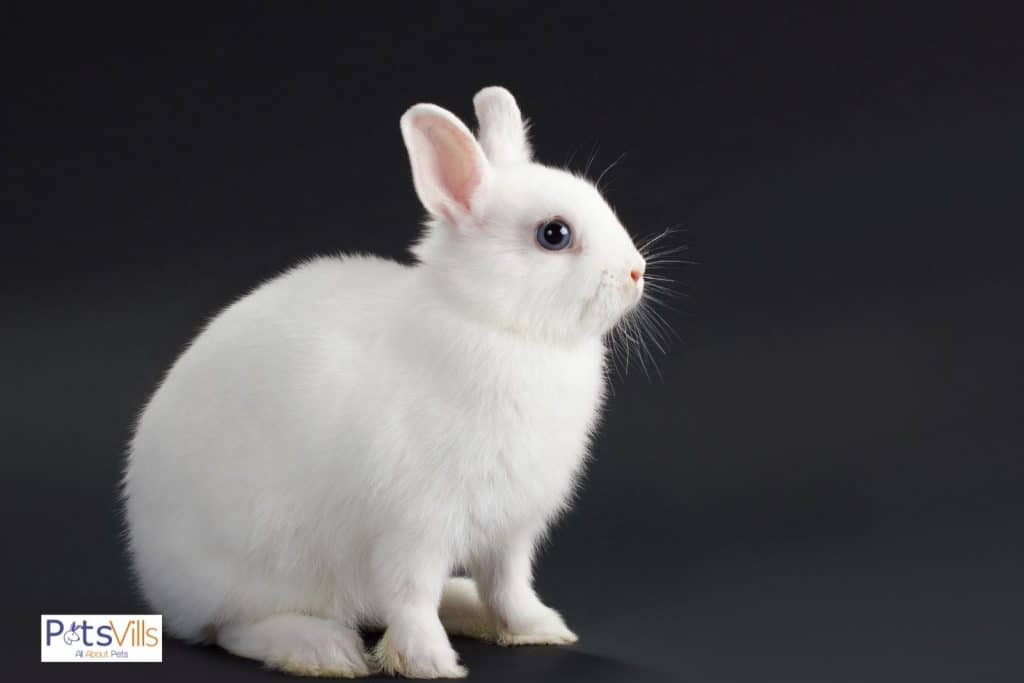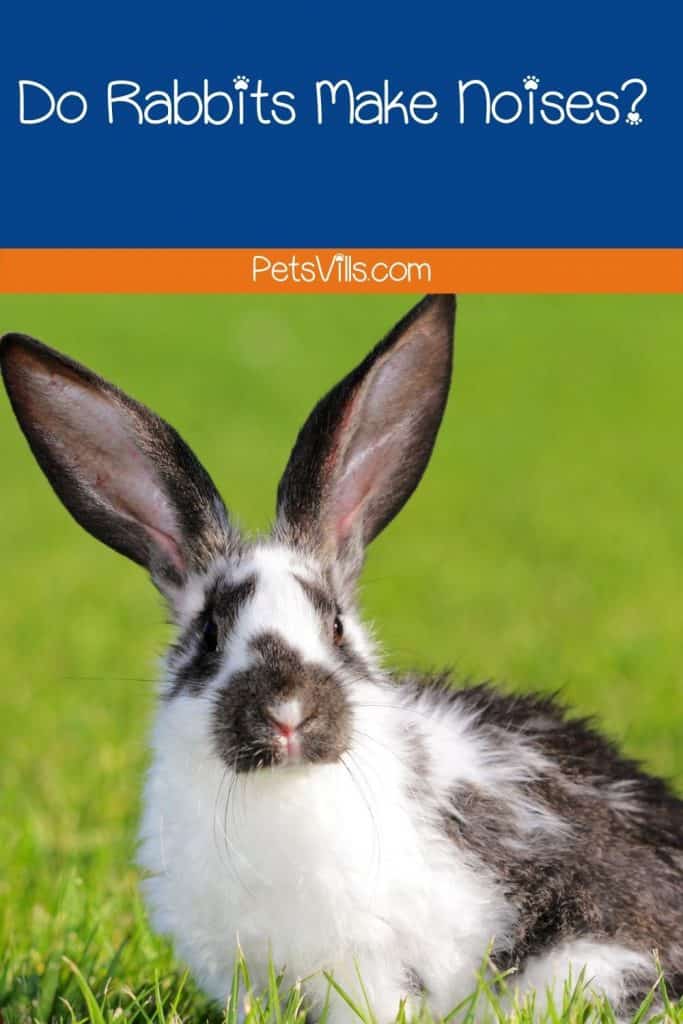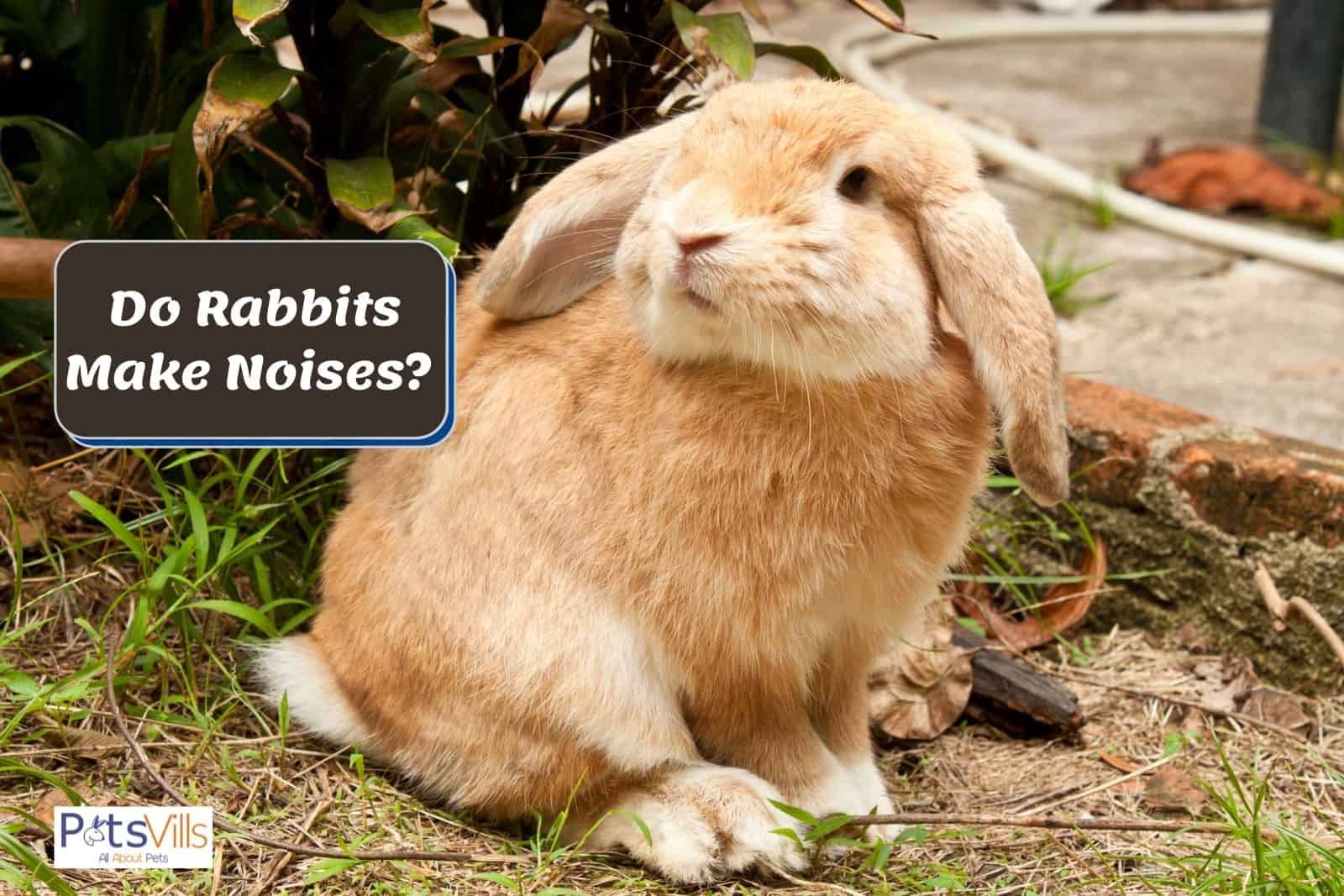If you are a pet owner, you are probably aware of the different sounds rabbits usually make. However, you may not be aware of the complete sound palette your rabbit possesses.
What Sounds Do Rabbits Make? Rabbits can make a lot of sounds. They can squeak, growl, honk, screech, grunt, and even scream.
In addition to various sounds and noises, rabbits also use body language to communicate with their owners and other rabbits.
This article will discuss the meaning of sounds, and noises rabbits make and learn how to understand a rabbit’s body language.
READ MORE: How Much Exercise Do Rabbits Need?
Table of Contents
Do Rabbits Make Noises?

Yes, rabbits make a wide variety of noises [1]. However, they don’t do it often. That’s why rabbit sounds are not common knowledge like cats meowing or dogs woofing.
Rabbits prefer to use body language to communicate with humans, but your pet rabbit will certainly get vocal occasionally.
Rabbits are prey animals [2], so they need to be as quiet as possible to avoid predators. Perhaps this is one of the reasons why they tend to keep silent even though they can make many sounds and noises.
What Sounds Do Rabbits Make?
Rabbits can make a plethora of sounds, and almost all of them help them express their feelings, state of mind, or physical problems.
Have a look at this video to know the meaning of sounds rabbits make.
Grunting/Snorting
Rabbits grunt and snort when they are scared or feel threatened [3]. They also tell their owners that they don’t want to be handled at the moment and want to be left alone.
It can often be followed by aggression, like biting or scratching.
Growling
Growling is similar to grunting and often occurs at the same time. It is usually a warning to other rabbits or humans about the impending aggression caused by fear.
Honking
Honking is a courting sound that rabbits make. However, your rabbit may start honking to display affection for you when you cuddle with it.
Honking can also mean that your rabbit is excited about something. This sound is quiet and soft, almost inaudible.
Humming
Humming, which is also perceived as buzzing sometimes, is another courting sound for rabbits. Even if there are no other rabbits around, hormonal rabbits may still make this sound.
Hissing
Rabbits make hissing sounds to scare off other rabbits and declare their territory.
Purring
The sound of a rabbit’s purring is similar to the sound a cat makes when it purrs. However, when a rabbit purrs, it comes out a bit softer.
Also, it doesn’t originate in the rabbit’s throat; instead, the sound is produced by gentle teeth grinding or clicking. Purring is usually a sign that the bunny is content.
Teeth Grinding
Unlike light teeth grinding that sounds like purring and signals content, sharp, loud teeth grinding means that your rabbit is in pain or discomfort.
If you hear your rabbit grind its teeth in this manner, it probably needs immediate veterinary care.
Watch this video to know more about this sound.
Clucking
A rabbit’s clucking [4] is much softer and quieter than the clucking sound chickens make. It sounds almost exactly like the sound of a clicker device used for dog training.
It is a sound of contentment, often caused by rabbits to express satisfaction with their current snack.
Squeaking
When a rabbit makes a squeaking sound, it usually signals happiness about something.
However, it can sometimes also be a sign of frustration, especially if the squeaking sound is deep rather than shrill.
Whining/Whimpering
Rabbits whine or whimper to signal that they are not interested in being handled. It is a sound of protest for many reasons, especially when they find themselves in an environment they are not happy with.
Screaming/Screeching
If you ever heard a rabbit scream, you know how terrifying the sound is. It is very similar to the sound of a scared child. Rabbits scream and screech only when they feel terrified for their life.
While this can sometimes be a false alarm, rabbits scream when they are genuinely in danger in most cases.
Check: How Often to Clean Bunny Cage
Rabbit Body Language
Rabbits have complex body language. They use a variety of body positions, postures, moves, nudges, and nibbles to communicate with us and with each other.
While they also make sounds and noises to communicate, they are more likely to express their feelings with body language.
Ears
Pay attention to your bunny’s ears. Rabbits use their ears to decipher what is happening around them, but they also express themselves.
For example, if your furry friend’s ears are up or twitching, that means that it is alert. If just one of its ears is up, it is still listening but not as closely. If both of its ears are down, your rabbit is relaxed and comfortable.
Nose
When rabbits wiggle their noses, they are observant, but if your rabbit wiggles its nose fast, it may also feel agitated.
Your bunny will rub its nose on you to display affection and trust. However, if your rabbit bumps you with its nose or nudges you, it usually means it wants you out of the way or that it wants your attention.
Eyes
Rabbits will close their eyes when they feel happy or try to rest. Although rabbits sleep with their eyes open, they may sleep with their eyes closed if they feel safe and comfortable enough.
Wide-open eyes, along with spiked-up fur, indicate fear. However, if your rabbit has its eyes open wide and ears straight up, it is probably excited about something.
Feet
Using their feet is perhaps the most expressive way for rabbits to show how they feel.
For example, thumping with their feet can signal fear, discomfort but it can also mean that your rabbit is looking for attention or trying to warn you about something.
Kicking with their feet is a sign of aggression but flicking and kicking their feet back while hopping is called binky, and it is a sign of excitement, happiness, and playful mood.
Posture
If your pet is standing on its hind legs, it may just be checking out something. However, this can also be a begging stance, especially if your bunny enjoys treats.
Lying flat on the ground, with legs spread out, is an excellent way to tell your rabbit is relaxed and comfortable. The same goes for lying upside down with legs in the air.
However, if your rabbit lies flat on its belly and keeps its head down and ears flat, it is safe to say that it is scared and trying to blend into its surroundings.
Rabbits will keep their head and tail up and ears back if they feel threatened by something.
If your rabbit is comfortable and happy, you have probably seen it flop onto the ground at random times. That means that it is completely relaxed and content.
READ MORE: Do Rabbits Stink as Pets?
How Do Rabbits Communicate With Other Rabbits?
Rabbits use sounds and body language to communicate with each other. We have already covered sounds that rabbits make and what they mean. Also, rabbits are more likely to use silent cues when communicating with each other.
For example, bunnies will use their ears, feet, eyes, nose, and posture to convey messages among themselves. The body language of rabbits is quite complex.
Rabbits can also use chemical cues to communicate. For example, they often use their scent glands on their chin by rubbing them to mark their possessions or territory.
They will also mark their territory by spraying urine, which you can prevent by spaying or neutering your bunny.
Rabbits are social animals, and they live in pairs or groups in the wild. Pet rabbits also prefer company, but you need to be careful when introducing two rabbits to each other since they may not get along straight away.
Please take a look at this video to know how they communicate with each other.
In this case, you need to pay attention to their body language to determine how well they get along. The first thing rabbits in pairs or groups do establish the pecking order.
Until they do this, they will try to assert their dominance, often leading to fights.
If you notice that your rabbits are lying with their head on the ground, that means that they have asserted their positions.
After that, the submissive rabbit will groom the dominant one, respecting the established hierarchy. This is the first sign of harmony, followed by eating together, playing, and mutual grooming.
However, getting to this stage can take some time, and you may notice signs of aggression if the bunnies can’t agree on who the alpha is.
If you notice that your rabbits are charging at each other, you should get them separated immediately.
How Do Rabbits Communicate with Humans?
Rabbits also use sounds and body language to communicate with humans, just like they do with each other. However, they may not be as subtle with you as they would with other rabbits.
For example, rabbits are more likely to use sounds to communicate with humans than with other rabbits, especially when it comes to purring made by gentle teeth grinding.
Another common sound rabbits usually make for humans to show content is squeaking.
See here in this video that a bunny is squeaking to tell something to his owner.
The reason rabbits are likely to be more vocal towards humans is because they need to be quiet in the wild, so they don’t get noticed by predators.
When it comes to body language, you won’t have much problem interpreting what your rabbit is trying to tell you, even though it is more complex than vocalization.
Your pet’s ears, feet, and posture are usually enough to convey a message.
For example, if your bunny stomps its feet, it is trying to warn you about something or express fear. If it jumps around and kicks, it means that it is happy and playful.
Lying on the back with legs spread or in the air shows that your bunny is relaxed and content.
Your rabbit will show affection and trust by rubbing its nose on you. Of course, rabbits can also show aggression. If your rabbit nips at you or kicks you with its feet, it tells you to getaway.
And if you don’t listen, it may bite you.
How Do Rabbits Show They Are They Are Happy?
Rabbits will show that they are happy with sounds and body language.
What Sounds Do They Make?
Your rabbit can show content and happiness by purring, which it does by gently grinding its teeth. Another way to show content is clucking, a soft, clicking sound.
You may also hear an occasional squeak from your bunny if it is happy, although it can also mean that it is flustered by something if the squeak is deep.
How Do They Show It with Their Body Language?
Rabbits will keep both of their ears down if they are content. They may also close their eyes if they feel safe in your presence. If your bunny rubs its nose on you, it is showing affection.
Binky is a term used when rabbits flick and kick their feet while they jump or hop around, showing happiness and playfulness. Your bunny may also flop randomly onto the ground if he is completely relaxed.
How Do Rabbits Show They Are Scared?
You will tell if your rabbit is scared by its body language and the noises it makes.
What Sounds Do They Make?
Rabbits may snort, grunt or growl if they are scared to warn that they want to be left alone.
However, the clearest vocal sign of fear in rabbits is screeching or screaming, which they rarely do unless they fear for their lives.
How Do They Show It with Their Body Language?
Rabbits will keep their head down and ears flat while lying flat on their belly if they feel afraid of something. If they feel threatened, they may also keep their tail and head up, ears back, and open their eyes wide.
Bunnies may also use their feet to express fear by thumping. However, this can also mean that they need attention.
FAQs
Are rabbits good pets for kids?

Even though rabbits are social animals, they don’t always like to be held and handled.
They are easily scared and not the best fit for toddlers.
However, they can be good pets for kids older than six years, especially if a responsible adult is around.
Do rabbits smell bad?
Rabbits are very clean, self-grooming animals. Their fur is odorless, and if you keep their living area clean, they will not smell bad.
My rabbit is making a wheezing noise?
Stressed rabbits or rabbits with a lowered immune system or breathing problems can make wheezing sounds while breathing.
If you are concerned, a visit to the vet would be your best option.
Resources
- 1. Rabbit Fun Facts [Internet]. www.petmd.com. Available from: https://www.petmd.com/rabbit/care/evr_rb_rabbit-fun-facts
- 2. Rabbits should show normal behaviour patterns [Internet]. nidirect. 2015. Available from: https://www.nidirect.gov.uk/articles/rabbits-should-show-normal-behaviour-patterns
- 3. Subject Overview and Background Information [Internet]. 2009. Available from: https://anrcatalog.ucanr.edu/pdf/8389.pdf
- 4. How to Understand Rabbit Body Language and Behavior [Internet]. Available from: https://www.hayward-ca.gov/sites/default/files/police/Rabbit-Behavior.pdf

Do your rabbits make noises? How do you understand them? Let us know in the comments.
Alina Hartley is a small-town girl with a ginormous love of bearded dragons. It all started with Winchester, a baby bearded who was abandoned at the shelter by his former owners because of a birth defect that caused one front leg to be shorter than the other. Alina originally went to the shelter looking for a guinea pig, but one look at Winchester and it was love at first sight. From that day on, Alina has dedicated her life to learning everything she can about bearded dragons. She loves helping new beardie parents start their incredible journey with these magnificent reptiles.
Follow her on:
LINKEDIN
TWITTER.
Read her latest articles HERE
Learn more about her HERE.


